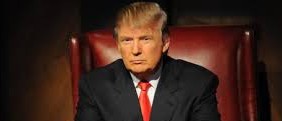There is no doubt that the Republican elite’s Loyalty Oath demand is a cleverly conceived trap with which to catch Donald Trump. On the surface it seems reasonable to require all Republican primary candidates to commit to being ‘good losers’ and uniting behind the ultimate winner. Past experiences of Right-of-center ‘Third Party’ candidates have undoubtedly contributed to Democrat Presidential minority victories and more years of hard-to-reverse Leftist policies.
When Trump, early on, threatened a Third Party run if he wasn’t treated fairly, it may be said that he handed a gift to his enemies. During the first debate the gift was exploited right at the start by one of the moderators and Trump’s refusal to take the oath appeared to isolate him from the rest of the ’team’ – as it was intended to do. As it turned out his enemies were confounded, for his refusal to back down plus his perceived isolation from the despised Republican Party, set him beyond, outside and above all the others.
Those who are watching closely will know that the Loyalty Oath has nothing to do with the future 2016 Presidential election and everything to do with the present. The Republican elite is desperate to consign Trump’s insurgency to history’s waste bin and as quickly as possible. Their threat is that any candidate who refuses to sign the Oath will be barred from contesting in some States, automatically losing delegate votes that not even a write-in victory would overcome. This certainly would make it hard for him to win the nomination.
If Trump fails to sign he may suffer from such an exclusion. If he signs he will be revealed as a trimmer, a compromiser and not much different from any old Republican politician. The Republican elite sees this as ‘Heads we win and tails Trump loses’, and they must be salivating over the cleverness of the trap.
As we write this article Trump, according to the MSM, is about to meet with Priebus who represents the Republic Party official bureaucracy and who will place the pledge before him for signing.
It can be argued – and Trump’s most committed supporters may resort to this argument if he signs – that he can sign it now and disavow it later if he fails to win the nomination. But signing will look to many of those who have been drawn by his straight-shooting and refusal to cave to anyone or anything, like a fatal flaw in character.
In our view Trump can strongly argue for refusing to sign. He can claim that he is campaigning primarily as an American patriot and to repudiate the politics of a servile Republican Party machine. Consequently, if a winner emerges from the campaign who will not best serve the American people – and especially if the winner has benefited from rules manipulation or skullduggery – he, Trump will go directly to the voters. He can point out that none of those who sign the pledge are legally bound by it.
It is our view – and we hope it is also Trump’s view – that if he wins the nomination – a big if should he be excluded from some States – there are many in the Republican elite who will do everything possible to prevent his occupancy of the White House. Bret Stephens, Daniel Henninger and those ‘open borders/ a browner America’ gang clustered around the WSJ would no doubt prefer internationalist Hillary Clinton to Nationalist Donald Trump.
Our advice to Trump is that he insists that before he signs any Third Party pledge, the Party will require every Republican rival, leader and official to sign a similar commitment to publicly support him if he wins the nomination. True loyalty is a two-way commitment and the old saying about ‘sauce for the goose is sauce for the gander’ comes to mind. We believe that this tactic would sink the Loyalty Oath.
Until The Donald reveals feet of clay this website will continue the “weirded-out psychodrama” that is so entertaining the WSJ’s Daniel Henninger.
Music Choice
With one recording we can maintain the theme of today’s article which is Trumpets and (Trump’s pledge) dilemmas. After the early deaths of the awesome trumpeter Fats Navarro and genius (saxophonist) Charlie Parker, the flame of great jazz music passed to the trumpeter and composer Clifford Brown. Unfortunately he too suffered an early car crash death at the age of 26, leaving the far less talented and racially angry Miles Davis to become the face and trend-setter of 1960’s jazz.
We recommend the 1954 recording of Clifford Brown’s own composition “George’s Dilemma”. Brown is on trumpet, Harold Land (tenor sax), Richie Powell (p), George Morrow (b) and Max Roach (d).
